MAIN INDEX
PURPLE
ZONE
RED
ZONE
BLUE
ZONE
PINK
ZONE
GREEN
ZONE
YELLOW
ZONE
INTERNATIONAL,
PROVINCIAL
& STATE
PAVILIONS
CORPORATE PAVILIONS & THEME EXHIBITS
BCTV (British Columbia Television)
General Motors (Spirit Lodge)
GREAT HALL OF RAMSES II
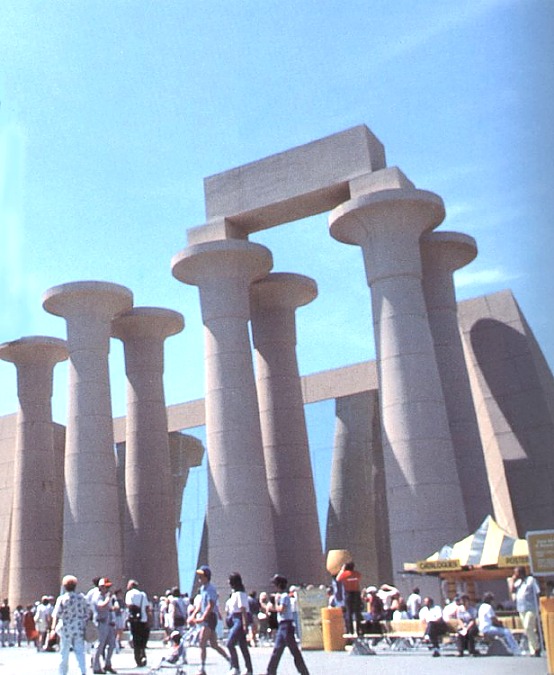
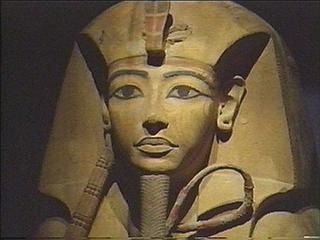 The
Great Hall of Ramses II was a unique structure inspired by the famous
rock
temples of Abu simbel. Visitors entered the pavilion by passing through
a row of graceful columns. Inside, visitors found themselves in a
dark, cavernous maze of dimly lit rooms and tunnels as if they had
stumbled
upon an ancient unlooted tomb. To keep the experience as
realistic
as possible, there were no written descriptions on the walls.
Instead,
visitors were given a headset which was linked to receive audio
broadcasts
from each exhibit. Audio descriptions were available in several
languages.
The
Great Hall of Ramses II was a unique structure inspired by the famous
rock
temples of Abu simbel. Visitors entered the pavilion by passing through
a row of graceful columns. Inside, visitors found themselves in a
dark, cavernous maze of dimly lit rooms and tunnels as if they had
stumbled
upon an ancient unlooted tomb. To keep the experience as
realistic
as possible, there were no written descriptions on the walls.
Instead,
visitors were given a headset which was linked to receive audio
broadcasts
from each exhibit. Audio descriptions were available in several
languages.
This informative exhibition offered a glimpse of one of ancient Egypt's most influencial rulers. Ramses' reign from 1290 to 1224 BC was the second longest in Egyptian history.
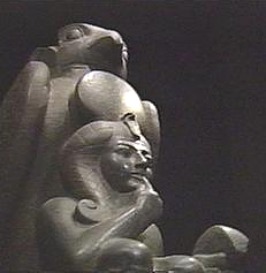
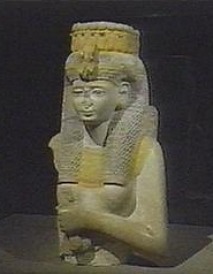
More than 80 precious objects included a workman's limestone level, a bone and ebony Senet game, the world's first known water clock and an array of monumental statues.
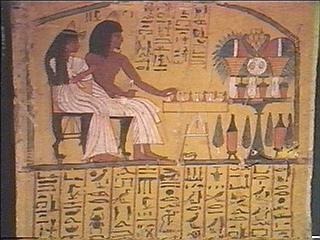 There
were critics who questioned what ancient treasures had to do with a
World's
fair on transportation and communication, but most people accepted the
exhibit as a once in a lifetime chance to see artifacts dating back
over
3000 years. After all, isn't art a form of communication? Doesn't
archaeology unveil long forgotten stories from the past? Regardless how
people saw it, the Great Hall of Ramses became so popular it was one of
the few pavilions that offered (free) time-stamped tickets at the gate
to avoid long line ups. The early morning dash from the West Gate to
the
Ramses ticket booth became a daily ritual and was eventually nicknamed
"The Ramses 500."
There
were critics who questioned what ancient treasures had to do with a
World's
fair on transportation and communication, but most people accepted the
exhibit as a once in a lifetime chance to see artifacts dating back
over
3000 years. After all, isn't art a form of communication? Doesn't
archaeology unveil long forgotten stories from the past? Regardless how
people saw it, the Great Hall of Ramses became so popular it was one of
the few pavilions that offered (free) time-stamped tickets at the gate
to avoid long line ups. The early morning dash from the West Gate to
the
Ramses ticket booth became a daily ritual and was eventually nicknamed
"The Ramses 500."